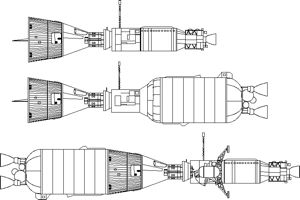
Home - Search - Browse - Alphabetic Index: 0- 1- 2- 3- 4- 5- 6- 7- 8- 9
A- B- C- D- E- F- G- H- I- J- K- L- M- N- O- P- Q- R- S- T- U- V- W- X- Y- Z
Gemini-Centaur

Gemini-Centaur
Gemini Docked to Centaur for Circumlunar Flight
Credit: © Mark Wade
Status: Study 1962. Gross mass: 3,170 kg (6,980 lb).
This was a threat to Project Apollo and was suppressed.
At its birth Gemini was known as the Mercury Mark II program. NASA was already committed to the three-man Apollo spacecraft and considered Gemini an interim spacecraft to test rendezvous, docking, and EVA techniques before Apollo was available. But NASA's James Chamberlin and McDonnell Aircraft considered Gemini as a viable competitor to Apollo for the circumlunar and lunar landing missions. Such proposals might have been welcomed by the later 'cheaper, better, faster' NASA. But in 1961, as a direct challenge to the Apollo project and Lyndon Johnson's dream of a Southern High Technology Crescent, they were anathema.
The original August 14, 1961 Mercury Mark II program plan went like this:
- Date: Flight: Description
- Mar 1963: Gemini 1: Unmanned orbital
- May 1963 : Gemini 2: Manned orbital
- Jul 1963 : Gemini 3: 7-day manned orbital
- Sep 1963 : Gemini 4: 7-day manned orbital
- Nov 1963 : Gemini 5: Agena docking
- Jan 1964 : Gemini 6: 14-day primate orbital
- Mar 1964 : Gemini 7: Agena docking
- May 1964 : Gemini 8: 14-day primate orbital
- Jul 1964 : Gemini 9: Agena docking
- Sep 1964 : Gemini 10: Agena docking
- Nov 1964 : Gemini 11: Centaur docking, boost to high Earth orbit
- Jan 1965 : Gemini 12: Centaur docking, boost to high Earth orbit
- Mar 1965 : Gemini 13: Centaur docking, boost to Lunar flyby
- May 1965 : Gemini 14: Centaur docking, boost to Lunar flyby
Crew Size: 2. Habitable Volume: 2.55 m3.
Family: Lunar Flyby, Manned Circumlunar, Moon. People: McDonnell. Country: USA. Launch Vehicles: Titan. Agency: NASA. Bibliography: 205, 207, 208, 210, 26, 40.
 | Gemini-Centaur-LM Gemini-Centaur-LM 640 pixel Credit: © Mark Wade |
Back to top of page
Home - Search - Browse - Alphabetic Index: 0- 1- 2- 3- 4- 5- 6- 7- 8- 9
A- B- C- D- E- F- G- H- I- J- K- L- M- N- O- P- Q- R- S- T- U- V- W- X- Y- Z
© 1997-2019 Mark Wade - Contact
© / Conditions for Use
